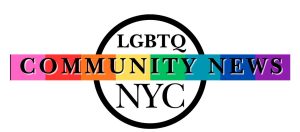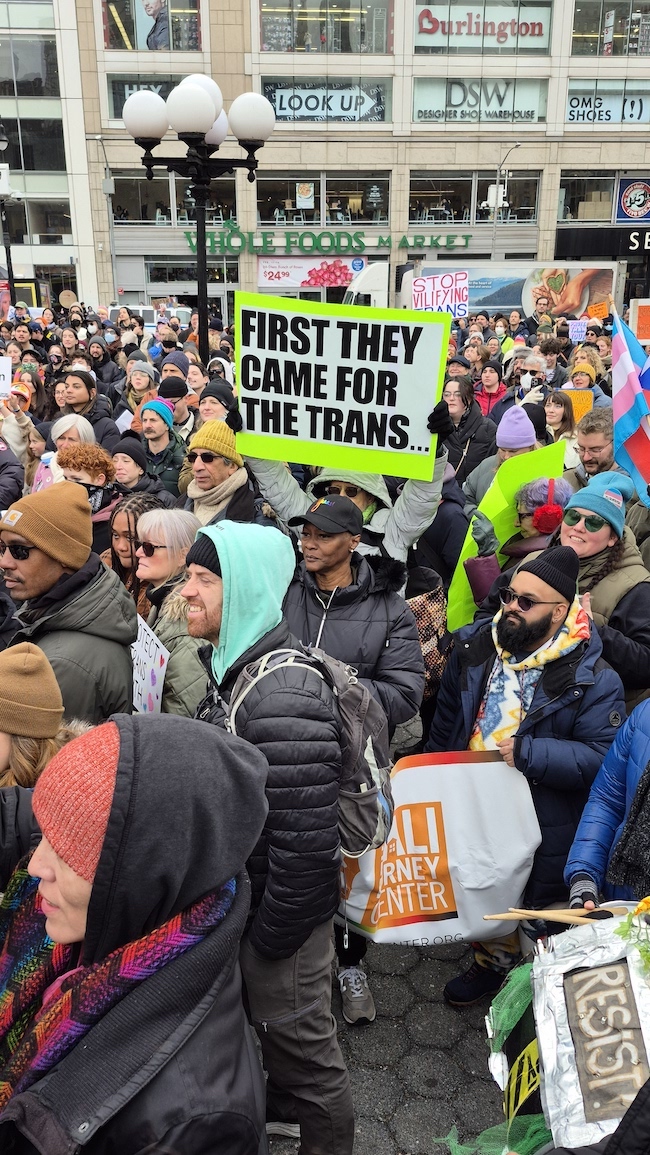
WRITTEN & REPORTED BY JAY W. WALKER | On July 20, the United States reached the six-month marker for the second Trump Administration. That benchmark coincided with the end of 180-Day Agenda timeline laid out in the Russell Vought/Leonard Leo/Heritage Foundation’s Project 2025, which has served as Trump’s and the Republican Party’s policy guideline manifesto since Trump’s apparent victory in the November, 2024 presidential election.
Attacks on LGBTQIA2S people and communities, particularly folks within the TGNCNB (Transgender, Gender-Nonconforming, and Non-Binary) spectrum, have been central to implementing this policy agenda; so, for this, our October 7, 2025 launch of our LGBTQCommunity News, a review of both the attacks on our communities and our responses to them as part of the larger resistance are in order.
As mentioned, Trans and Gender-Nonconforming members of our communities have borne an outsized burden. Regressive gender “norms” are as important to the GOP’s “anti-woke” agenda as white supremacy. Accordingly, the nation has seen the Trump administration repeatedly leverage threats to pull funding from public K-12 schools and universities to force changes in access to Trans supportive healthcare, curricula, and athletics programs. The administration has actively worked to remove all protections against discrimination for Trans folks within the federal system and for its contractors. It has thrown Trans people’s access to accurately gendered passports and other forms of identification into a whirlwind of confusion and conflicting messages. It has instituted a regime of denials of gender affirming care for Trans youth, threatening the federal funding of major universities if their health systems continue offering these services to young people in the wider communities they serve.
Finally, it has actively worked to scrub any mentions of Transgender issues or people from all government websites operated under the purview of the Executive Branch. This of course includes the National Parks Service, which runs the Stonewall National Monument and eliminated Transgender references and the T and Q in LGBTQ from that site back in February.
In response to these outrages, embattled Trans communities and leaders have taken to the streets regularly to speak truth to power, share their stories, and condemn these attacks at the federal, state, and local level. In New York, organizations like New Pride Agenda, New York Transgender Advocacy Group (NYTAG), Black Trans Liberation, Equality New York, Sylvia Rivera Law Project, Gays and Lesbians Living in a Transgender Society (G.L.I.T.S.), Translatinx Network, New Alternatives, The Ali Forney Center, Transformative Schools, The Harvey Milk School, NYC Youth for Trans Rights, The Audrey Lorde Project, Callen-Lorde Community Health Center and The NYC LGBTQ Center, The ACLU/NYCLU, and others all responded to this existential crisis for Trans communities, partnering frequently with one another on numerous strategies and responses.
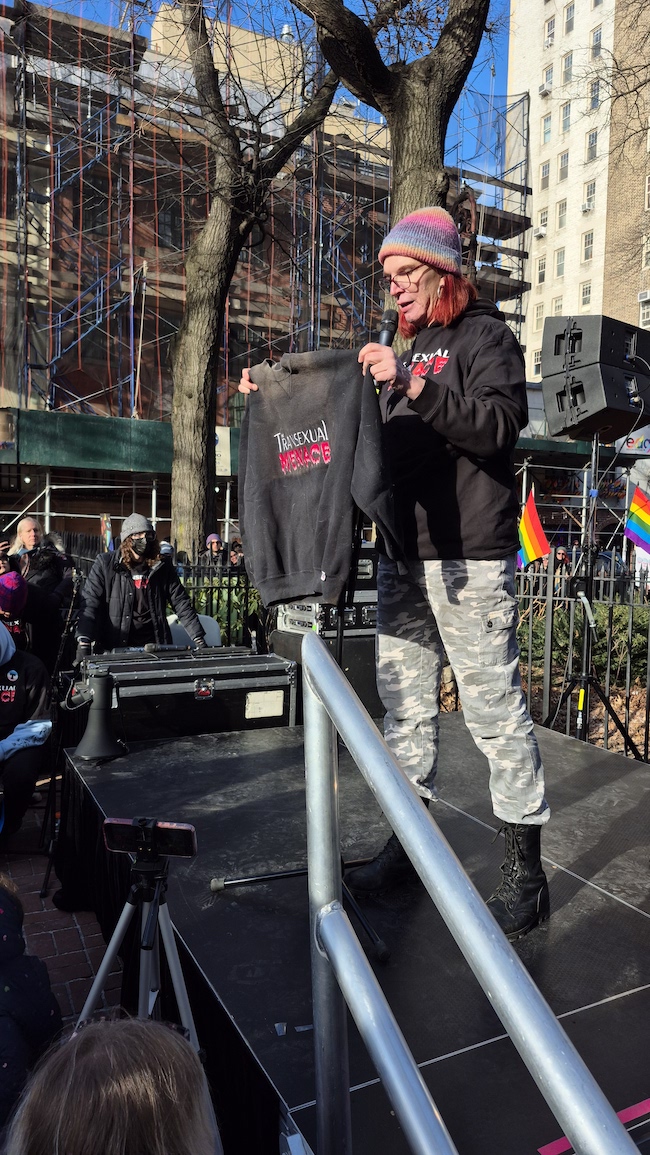
Shortly after the start of the new administration, a blast from the past came roaring back to life with greater than ever relevance. Denise Norris and Riki Wilchins, who co-founded The Transgender Menace back in 1993, decided that it was time to re-energize the group and reach out to young TGNCNB people utilizing the communication tools Gen Z has pioneered, inspiring them with their direct-action approach. On this year’s Trans Day of Visibility, March 31, scores of events and actions took place across the nation, several in New York City alone.
But, while TGNCNB bear the brunt of the attacks by the Trump Administration, our cisgender and thoroughly binary communities have hardly been ignored. Trump’s day-one attack on Diversity, Equity, and Inclusion (DEI) programs — the opening salvo of his “anti-woke” agenda – directly affects funding for all LGBTQ studies and support structures at the university level, as well as in government work. We have also seen the chilling effect that the Trump invective against DEI has had on some corporations like Target, McDonalds, Meta, Ford, and Gannett. Secretary of Defense Pete Hegseth has been actively purging references to LGBTQ issues from the Department of Defense website using a keyword search scheme that resulted in references to the famous A-Bomb transport plane the Enola Gay being expunged.
Trump has been very particularly attacking LGBTQ access to healthcare and studies intended to improve our health, both here and abroad, particularly as it relates to HIV/AIDS medication and research. Most recently, in May, the administration scrapped $800 million in funding for research into health of LGBTQ people. This June, Trump refused to acknowledge Pride month, and in July, references to Bisexuality were removed from the Stonewall NPS site.
While cisgender gay men, lesbians, and bisexuals have actively participated in many of the public actions against Trump’s anti-Trans policies, the attacks on the Ls, Gs, and Bs have received precious little attention in either the streets or in the media. As such, the narrative that has developed is one of Trans and gender non-conforming Americans, who have always been the most vulnerable among us to scorn and ridicule from the straight world, as the only LGBTQ victims of Trump’s and the GOP’s hateful agenda.
The relative wealth, privilege, stability, and societal acceptance that our cisgender cohort enjoys has served to insulate many of us from having to face the mounting threat, and to mask that threat from the supportive straight members of our circles and families, further separating the L, G, and B from the T and the Q in the public consciousness, and certainly in the media. Over the past several years, the increase in public anti-Trans rhetoric from cisgender members of our communities has risen, as has alignment with Trump and the MAGA movement.
Several high-profile members of the current and former Trump administration, and billionaire, private sector allies of it are openly gay or lesbian. Treasury Secretary (and newly appointed head of the Internal Revenue Service) Scott Bessent, Interim Kennedy Center ED Richard Grenell (who was an interim Director of National Intelligence in Trump’s first term), and former Trump State Department spokesperson and newly appointed Deputy Ambassador to the UN Tammy Bruce are all openly gay. Billionaire German-American immigrant Peter Thiel, the out(ed) gay PayPal founder, who was brought up in part in the Nazi venerating German community of Swakopmund, Southwest Africa (now Namibia), was an early mentor to Vice-President JD Vance, and his data-mining company Palantir was tapped by Trump to compile data on Americans and three of its former employees were highly placed within Elon Musk’s DOGE operation to eviscerate and spread white supremacist anti-LGBTQIA ideology throughout the federal government.
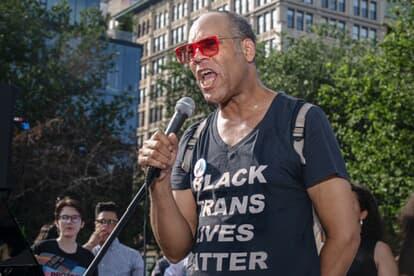
Open AI CEO Sam Altman and Apple CEO Tim Cook, both gay, each donated $1 Million to Trump’s inaugural. In August, Cook paid a very well-publicized visit to the White House to announce a plan to invest $100 Million in American manufacturing and pay obeisance to Trump, presenting him with an etched glass plaque set in a tacky 24 carat gold base. Beyond these functionaries and billionaires, there is a growing list of out LGBTQ and TGNCNB personalities and social media influencers – from Olympic athlete-cum-reality show embarrassment Caitlyn Jenner to drag queen Ms. MAGA to Black, gay Army veteran Rob Smith – for whom MAGA identification has become core to their public personas and bank accounts.
While it is easy to dismiss these LGBTQ MAGA devotees as outliers among the overwhelmingly liberal and progressive American LGBTQ and TGNC population, the fact that they (for whatever reason) have aligned themselves with an administration and movement bent on demonizing, marginalizing, and erasing consideration of our rights in the public sphere – at times from positions of outsized power and influence – is deeply concerning.
It is with all these concerns in mind that I reached out to a few millennial LGBTQ leaders who have been at the forefront of many of the intersectional movements in the resistance to the Trump administration’s attacks on the American people. Yanery Cruz (she/her), Jawanza James Williams (he/him), and Jason Rosenberg (he/him) have all been extraordinarily active in queer and trans organizing and activism, both on their own and as employees and volunteers for numerous organizations. I wanted to find out how they felt this “Resistance 2.0” was progressing and to give their perspectives on the work ahead for our LGBTQIA2S+ communities and the broader citizenry. What emerged from our conversations was a good snapshot of a moment in time that might very well define the future of our democracy and republic.
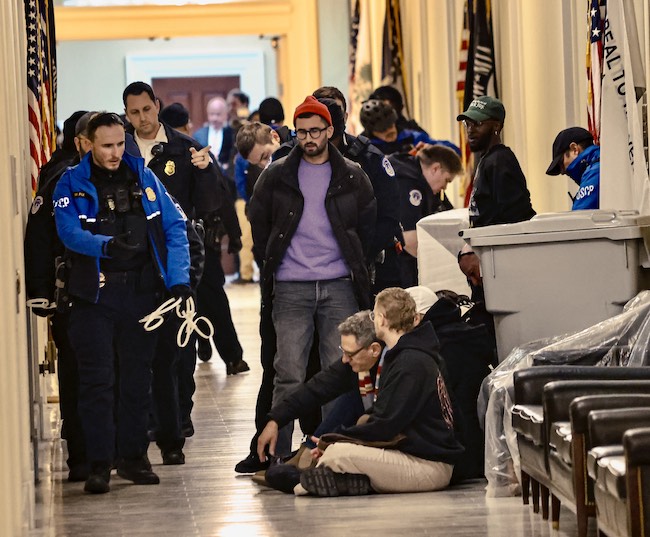
Jason Rosenberg has spent the last nine months working in three areas: organizing against the genocide in Gaza with Jewish Voices for Peace; working with Raquel Willis’s Gender Liberation Movement on issues of bodily autonomy around reproductive rights and gender affirming care; and working with a broad collective of HIV/AIDS advocacy organizations on domestic and international access to lifesaving care. Says Rosenberg, “I think maybe we haven’t been able to figure out how to uniformly respond in mass mobilization and in a broad umbrella coalition.”
Referring to his three focal areas, Rosenberg says, “All of them deserve more attention and people power and we haven’t been able to get that mobilization that those causes and issues deserve, especially the people who are impacted by them. HIV/AIDS is thought about as something that is in the past something that isn’t an ongoing epidemic.” Rosenberg sees a lot of complacency in the broader LGBTQIA2S+ communities in the face of the legislative and rhetorical attacks on us across the country. “There was a moment of mass mobilization at the beginning of the administration, were we saw folks show up for trans people,” he notes. “There were a lot of rallies for trans youth, especially how it was impacting New York City Trans youth, with how some of the hospitals caved in to this administration;” but now we see the most visible and influential gay Democratic politician, “Pete Buttigieg, go on NPR and say that we should take anti-trans parents seriously and that they have legitimacy in their moral panic.”
Rosenberg feels that that stance of “Mayor Pete’s” is emblematic of the Democratic Party as a whole: “They are not showing up the way that they should. They are not protecting our trans siblings the way that they should.” That said, Rosenberg does see some hope on the political scene. “I get a lot of hope from Zohran and his [mayoral] campaign. He is a beacon of what the Democratic Party could and should be if we let it. He exemplifies what it would mean if we put communities first. If we don’t get backed by foreign interests and billionaires.”
Asked about the broader Resistance, Rosenberg indicated that, while appreciating the large, national mass-mobilizations that got millions of American in hundreds of cities and towns out into the streets, he believes that “One-off marches and direct actions are not what are going to defeat fascism. It is actually putting our money, our bodies on the line, and creating new possibilities and levels of risk that maybe we didn’t think we would have to take, or that we’ve thought about, but aren’t implementing, especially how we show up for the most vulnerable at the moment: immigrants and trans people. We clearly aren’t doing enough…We only defeat fascism through queer liberation.”
Rosenberg sees queer liberation as broadly and radically inclusive immigrant struggles, the struggle against the US-assisted genocide taking place in Gaza, reproductive freedom, and economic freedom, saying, “All of this impacts everyone. Queer Liberation is dependent on everyone and will benefit everyone. That’s why we have to model coalitional and collective liberation in all spaces we enter.”
Asked about some cisgender gay people’s lack of response to the attacks on Trans people, Rosenberg says, “If it doesn’t impact a person’s day to day life and lifestyle, they won’t be moved to fight against it. The larger queer movement has been doing such a disservice to our trans and non-binary siblings, who have led and birthed our movement, to let all of this happen with little disruption.”
Jawanza James Williams describes himself as an organizer. To my mind, he is a people’s prophet. His passion and brilliance are almost overwhelming in their ferocity; but are fortunately tempered by an innate kindness and joy that suffuse his words and work. His focus over the last nine months has been on recommitting himself to the work of crafting the critical lens to understand what is happening to the world in this moment. Political education in developing the ability to draw connections on the macro and micro levels in order to historicize our response and our resistance.
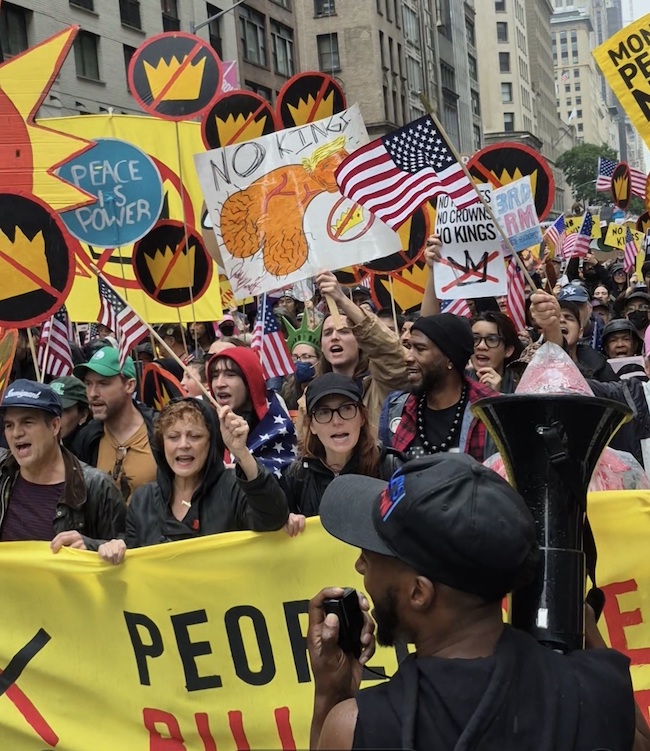
To Williams, LGBTQIA2S+ are a vital part of this intersectional resistance to authoritarian fascism. “Queer people are the ‘canary in the coal mine.’ We are the leaders in the forces of love, care, compassion, nuance, and clarity, leading all of humanity toward liberation. Not that we’re always right about every single thing; but it is because of our identities and our experiences–our survival–that we are able to sound the alarm, that we are able to show up. And we know that we have no choice because we hold these complex identities, these complex experiences. And that doesn’t change, no matter where we are in the world.”
That said, Williams sees some marked differences between now and 2017: “I’ve been thinking: What is the difference between now and 10-12 years ago when I first started organizing in New York? I feel that there was a much higher energy, a lot more people involved, a lot more organizations, and I am very alarmed by it all.” Media bears a significant responsibility for the relative absence of Queer, Trans, Black, and Brown perspectives being highlighted. Asked about how he about the LGBTQIA2S+ communities are being included in the analysis of Trump 2.0, Williams responds, “I feel that the response right now in this particular fascist turn pales in comparison to what we need; and I think that reflects the reduction in the infrastructure of media centering Black, Queer, and Trans voices–the more marginal voices. It just feels like we aren’t responding as a collective with the energy that this moment requires of us.”
That broadly based erasure of our perspectives in the largely straight, white and cisgender organized national calls to action have been concerning Williams: “White, cisgender, heterosexual people are fatigued with critique against how they behave and being called upon for a transformation. I think that the reduction in the press available about us and for us is a reflection of that. It is a degradation of the infrastructures of response.”
He adds, “There was a time when White progressives understood that they had to take a seat back and add energy and resources into the fight without leading the direction of it, without deciding the tone of it, and I feel that that has changed. Even in our progressive spaces–our leftist spaces–Black, Brown, Queer, and Trans people are almost resented for having been right in what we were saying, and I think that some of our allies are fatigued with our critique. But our critique isn’t an attack; it is an illumination. And an illumination isn’t always pleasant. When you open the curtains early in the morning, sometimes it’s a little rough, a little difficult; but we need that sunlight.”
After the last eight years–first Trump 1.0, then Biden–“A lot more people understand that our critique and resistance isn’t just about regime change between the Democratic and Republican parties. The fact is that, if we are going to tell the truth and navigate the reality that we are experiencing collectively–globally–then we have to have fundamentally anti-capitalist perspectives. We have to understand the ways in which the Democratic and Republican parties…are capitalist parties.” Williams points to the failure of the Biden administration to effectively safeguard the republic from the worst excesses of a future Trump or Trump-like president, noting that in the Black Lives Matter movement, “We said ‘defund the police’ not just because we hate them; but to reduce the power, the scope, and the ability of this militarized force to be used against us undemocratically. And now what’s happening? We have had a military takeover of Washington D.C., of LA, and we are certain that a military takeover off New York City is on its way.”
Williams is unstinting in his damnation of American Democratic Capitalism. He wants people in our communities to understand “… not just that Donald Trump is a bad person or a bad leader, but that Donald Trump is simply a figurehead of a regime that doesn’t look too different whether it’s ‘blue’ or ‘red,’ that represents the interest of the capitalist class primarily. Not that the Democrats and the Republicans are exactly the same; but, at the same time, if the ultimate goal is to preserve the fundamental practices and structures of the capitalist state, if capitalism is anti-human, death dealing, and produces cultures of violence: anti-Black violence, anti-queer violence, anti-woman violence, or anti-feminine violence, anti-immigrant/anti-migrant violence, anti-Trans violence, then we have to be able to call that out.”
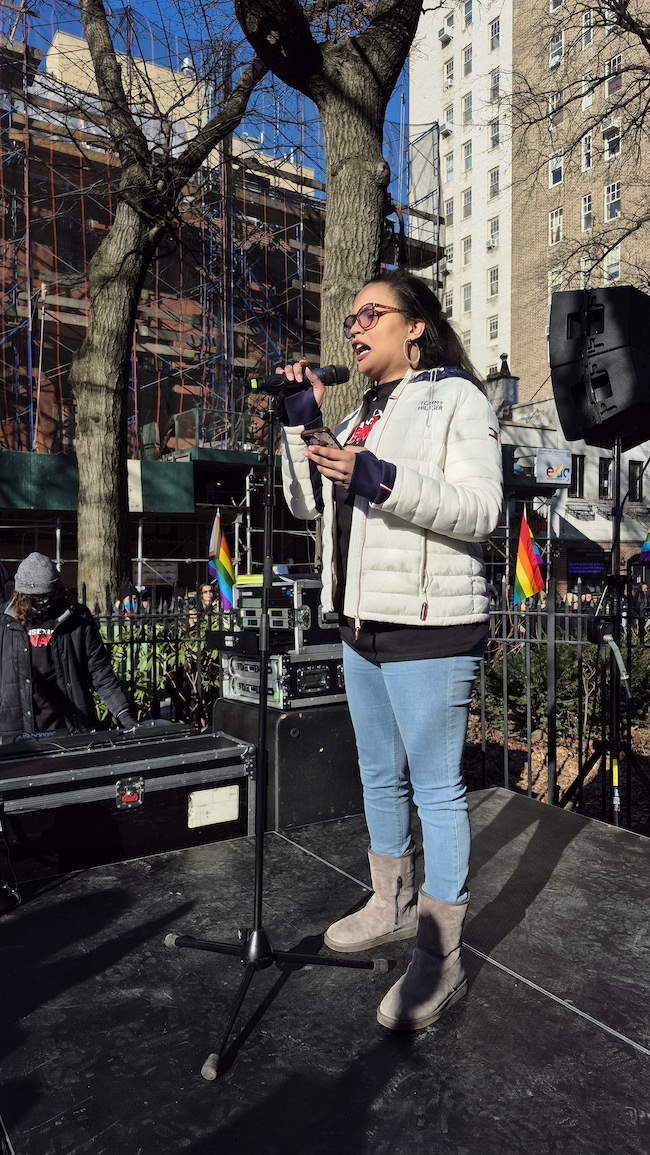
Over the last several years, Yanery Cruz has emerged as one of the most powerful organizers and leaders in the NYC community. As a Trans, Latina child of immigrants, the last 9 months have been exhausting. She compares the onslaught on multiple communities to the military tactic of Shock and Awe: “They bombard a country they are invading, with bombs and attacks on every single level, whether its famine or bombing or everything in between.” She feels that Shock and Awe is “being weaponized against the people of the United States of America. We’re getting attacked on every single level: When it comes to vaccines, when it comes to our right to vote, when it comes to trans people, women’s rights with the overturn of Roe v. Wade, the Supreme Court saying that ICE is allowed to judge someone’s immigrant status based on their race…EVERYTHING!”
Cruz recognizes the class struggle at the heart of this rise of American authoritarianism: “We’re all fighting for our collective survival because if you’re not part of the 1-percent, you’re just next in line. It just probably hasn’t been your turn yet.” But she also recognizes the schisms that continually bedevil our LGBTQ/TGNCNB communities. Asked about the state of our communities, she notes, “We’re a community that does not have a history of sticking together in general. Now is such a challenging time because it is showing why we should have been sticking together over the years, consistently. Because within the LGBTQ community, there has always been this separation between sexual orientation and gender identity.” She notes that as attacks against gender expansiveness ramped up over the past several years, a significant number of “LGBs” either paid no attention or adopted the rhetoric of oppression against TGNCNB individuals. But she says that now that the same rightwing forces have come for them, “The LGB part is seeing that you can’t have this movement without us Trans people because now they are talking about removing Gay marriages, as well. That pocket within the LGB community has noticed that we trans people are going to be the first targets; but they are going to come after your rights, as well. Marriage rights have always been on the table. We saw it within Project 2025, which went ignored by our Democratic party and wasn’t taken seriously, how organized they were.”
Yanery believes that unless our Queer (writ large) communities have some truly intentional conversations to address the multiple fault lines within and among our communities, we may not survive. “If we don’t stick together, they are just going to be able to pick us apart that much more easily. We must have an ‘in-house’ conversation. We have to have a family conversation getting to the nitty-gritty of why we have this separation. Why is there this huge separation between White gays and BIPOC gays? Why is there separation between cisgender people and transgender people?”
It is often said that hurt people hurt people. In examining the divisions our communities must overcome, Cruz notes, “It’s a community that has a lot of trauma. And then that trauma shows itself in the worst of times.”
To explain Trump’s LGB staffers and appointees (the “Vichy Gays” as writer Kevin Sessums dubbed them during his first term,) Yanery takes it back to the class struggle. “For the White, Washington gays who hold this stature within that fascist structure, they’re there because they have the privilege of economic security.”
Locally, Cruz points to serious failures within the political class. “What’s been missing within the Democratic party is solidarity amongst Democrats with a vision that is equitable for all of us, everyday people. I think what’s missing is integrity.”
“What’s missing is young visionaries having these political platforms with lived experience of an everyday New Yorker, like someone who grew up in the Kingsbridge section in The Bronx and knows that we have a fentanyl crisis and an opioid crisis, where historically our politicians have been dropping the ball, especially post-COVID. We’re missing boots on the ground perspectives in these political roles. Instead, we have corporate, greedy politicians whose only focus is to get more zeros in their bank accounts and a good article in the New York Times.” Pointing to the long term non-health-related effects of the COVID-19 pandemic, Cruz chides New York’s establishment political class for its cluelessness: “They are far removed from it because, if they have ever experienced any type of financial burdens, they are no longer in that position because they have people with interests and foreign agendas pouring money into them to keep them in line.”
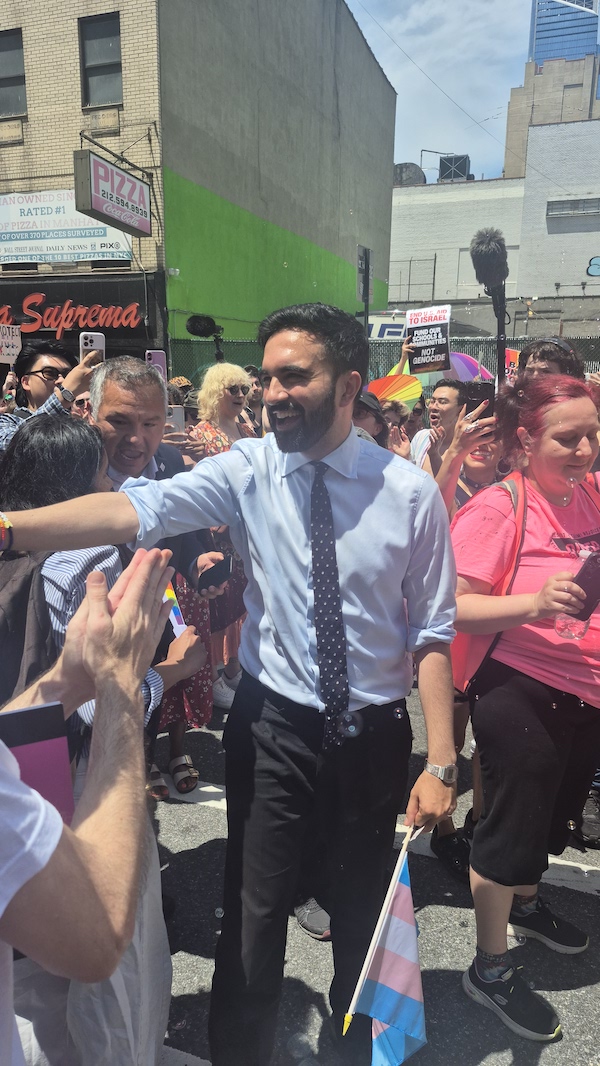
Still, Cruz maintains a sense of hope. “I see a glimmer of hope at the local level. Focusing, activating, and bringing public awareness to what is occurring on the local level is extremely powerful. The dim light of hope is coming from Zohran Mamdani and the campaign he is running on. So many people are feeling this breath of fresh air from Zohran Mamdani. We are seeing someone who is really thinking about the issues that are impacting us.”
Cruz gets “a lot of hope from Zohran and his campaign. He is a beacon of what the Democratic Party could and should be if we let it. He exemplifies what it would mean if we put communities first. If we don’t get backed by foreign interests and billionaires.”
Though Yanery, Jawanza, and Jason come from very different circumstances and journeys, their paths have bought them to the forefront of an evolving movement formed in resistance not simply to Trump and MAGA; but to the broader forces at the state, local, national, and global level pushing the vastness of humanity into the buzz-saw of diminished rights, depleted resources, White supremacist, colonialist, oligarchy. The forces arrayed against the work they do are immense and exceedingly wealthy. But still they rise, as do the coalescing movements in which they and thousands of other New Yorkers, and millions of other Americans are working daily. In the end, the work is about community: not just the LGBTQIA2S+ or TGNCNB community, the Black or Latine community, the Jewish or Muslim or Christian community, the Democratic party community, the NYC community, or even the American community. The work is about the community of humanity: about preserving it – protecting it – from what might very well be the greatest coordinated threat it has faced since the axis powers in World War II, if not ever. Even against these odds, Jason Rosenberg’s words ring true for all three and their comrades in Resistance: “I feel most hopeful and optimistic when I am in this community, when we’re in the streets together, when I’m side-by-side with people who have aligned values.”
—END—
ABOUT JAY W. WALKER | He is a co-founder of the Reclaim Pride Coalition, which has organized the annual Queer Liberation March since 2019. He is a founding and active member of the direct action activist organizations Gays Against Guns and Rise and Resist. His career in activism began in the 1990s as part of the October 19th Coalition. A New Yorker for 40 years, Jay hails from Hampton, VA. Walker has written for publications including POZ, The Nation, and The Advocate. A founding member of the activist “queertet” Sing Out Louise, Jay also co-hosts the weekly podcast, Gurl, Stop.
LGBTQCommunityNews.nyc is an independent, free source of queer-centric news, arts, info, and opinion content. Our website, podcast, and quarterly newspaper are funded by advertising revenue and reader donations. To support this project, click here for the GoFundMe campaign. Questions? Comments? Click here to contact us. To join the subscriber list of our free ENewsletter, click here.






